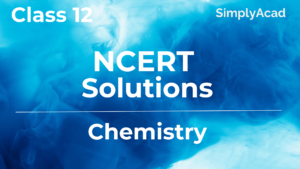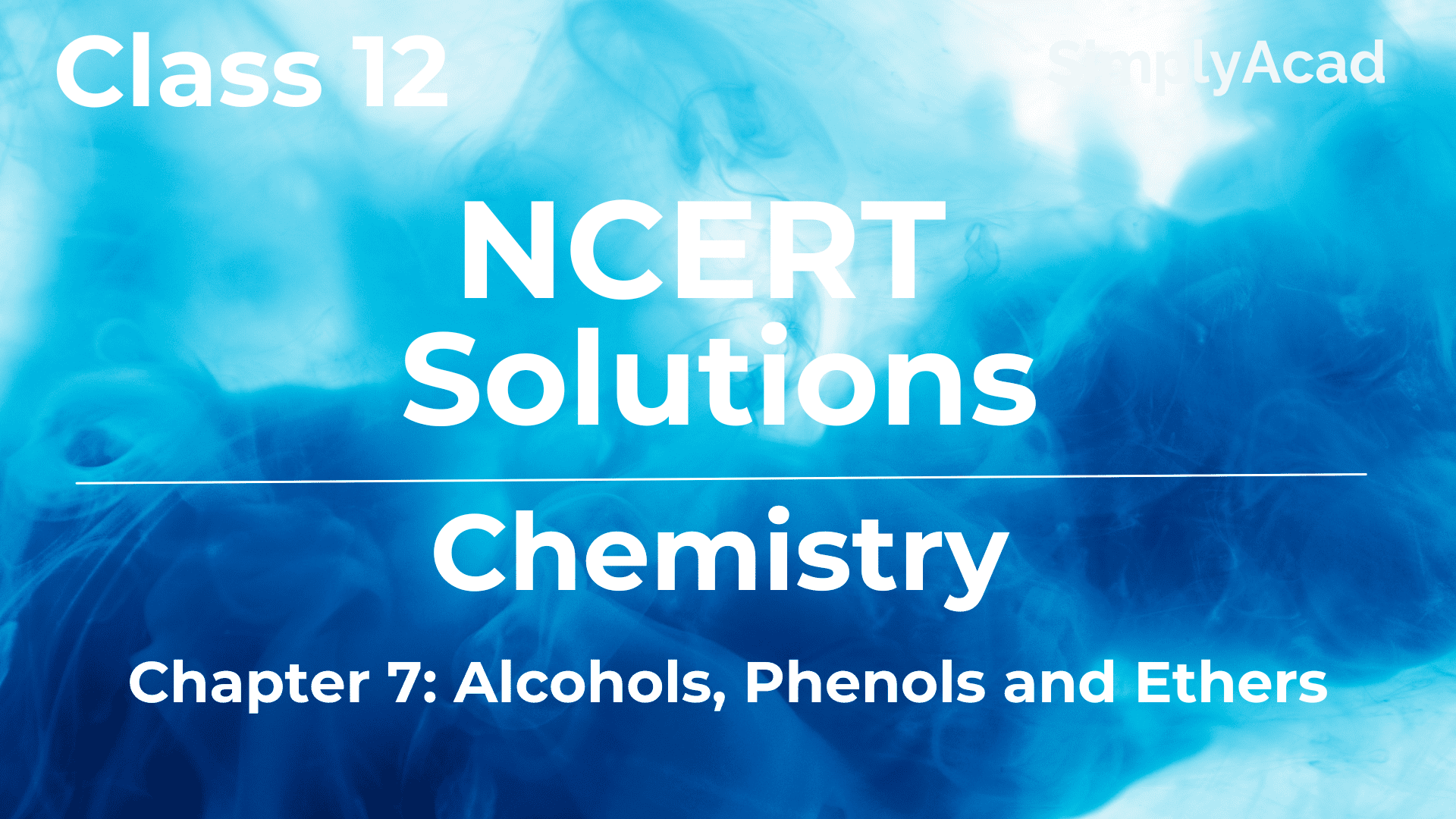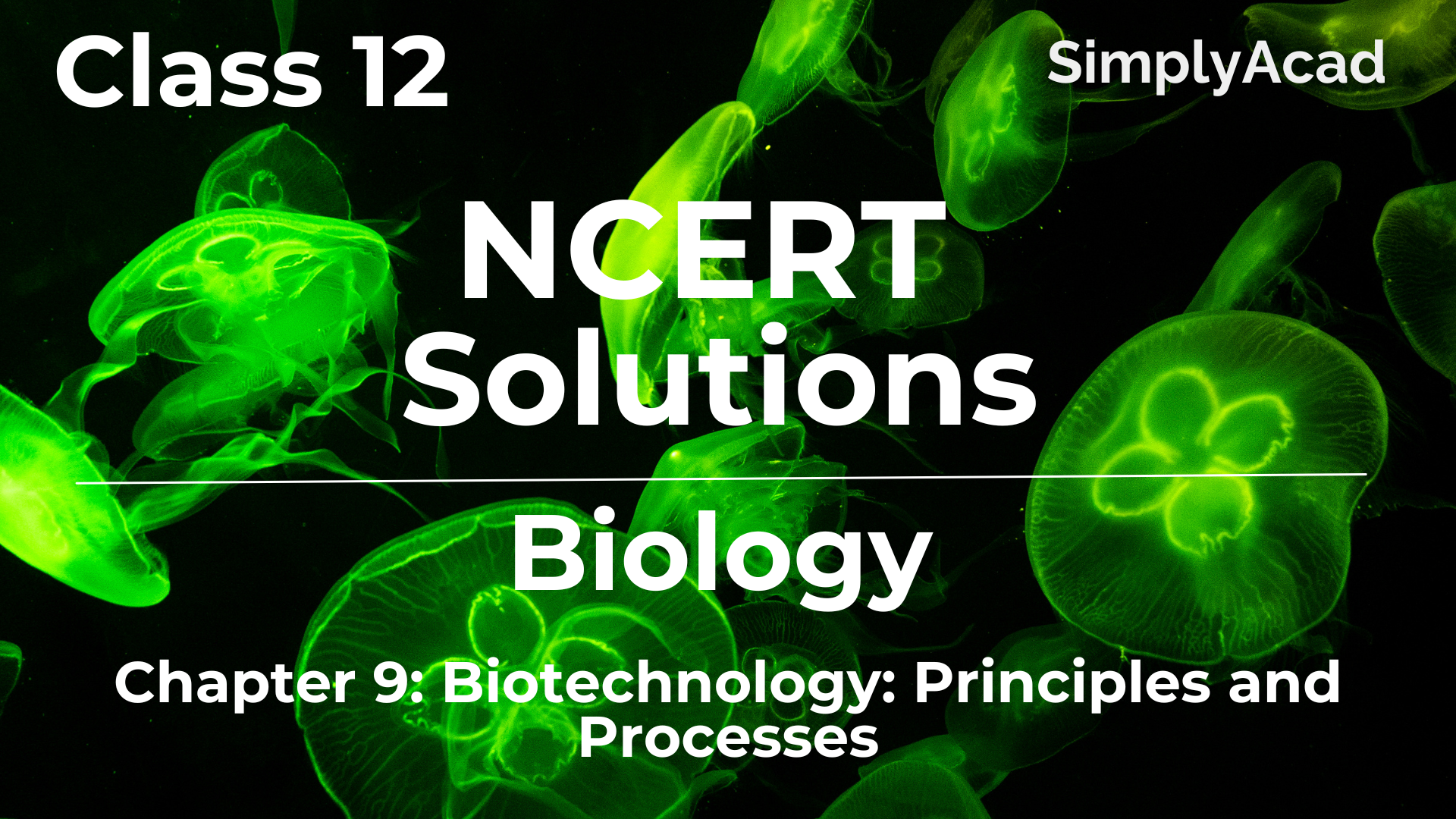NCERT Solutions for Class 12 Chemistry
NCERT Solutions for Class 12 Chemistry
SimplyAcad has brought you the best NCERT Solutions for Class 12 Chemistry. You can start preparing for the exams without any delay. The solutions provided here are written in a simple and easy-to-understand manner to avoid any confusion. Our experts have curated the answers skillfully for better understanding and clarity of concepts in students. The answers are prepared following the recently updated CBSE syllabus for 2024-25 in a systematic order. Students can use these solutions for quick revisions of the lengthy concepts, theories and formulas. They can easily access the answers by scrolling below and learning how to approach different questions of the chapters.

Chapter-wise NCERT Solutions for Class 12 Chemistry
- Chapter 1: Solutions
- Chapter 2: Electrochemistry
- Chapter 3: Chemical Kinetics
- Chapter 4: The d & f Block Elements
- Chapter 5: Coordination Compounds
- Chapter 6: Haloalkanes and Haloarenes
- Chapter 7: Alcohols, Phenols, and Ethers
- Chapter 8: Aldehydes, Ketones, and Carboxylic Acids
- Chapter 9: Amines
- Chapter 10: Biomolecules
Deleted Chapters of Chemistry Syllabus
The following chapters have been removed from the NCERT Class 12 Chemistry textbook 2023-24.
- The Solid State
- Surface Chemistry
- General Principles and Processes of Isolation of Elements
- The p-Block Elements
- Polymers
- Chemistry in Everyday Life
Marking Scheme: as per CBSE
| Unit No. | Name of Unit | Marks |
| 1 | Solutions | 7 |
| 2 | Electrochemistry | 9 |
| 3 | Chemical Kinetics | 7 |
| 4 | d-and f-Block Elements | 7 |
| 5 | Coordination Compounds | 7 |
| 6 | Haloalkanes and Haloarenes | 6 |
| 7 | Alcohols, Phenols and Ethers | 6 |
| 8 | Aldehydes, Ketones and Carboxylic Acids | 8 |
| 9 | Amines | 6 |
| 10 | Biomolecules | 7 |
| Total | 70 |
NCERT Solutions for Class 12 Chemistry: Chapter Highlights
-
Chapter 1: The Solid State
Learn about solids, crystal structures, and differences between crystalline and amorphous forms. Use NCERT Solutions from SimplyAcad for a better grasp of these concepts.
-
Chapter 2: Solutions
Covers types of solutions, concentration methods, and properties like vapor pressure. Essential for exams like JEE. Resources available at SimplyAcad.
-
Chapter 3: Electrochemistry
Understand the link between electrical and chemical energy, electrochemical cells, and electrolysis. Access SimplyAcad for help with numericals and revision.
-
Chapter 4: Chemical Kinetics
Focuses on reaction rates, factors affecting them, and collision theory. Study materials include notes and practice questions from SimplyAcad.
-
Chapter 5: Surface Chemistry
Explore catalysis, adsorption, and colloids. Use SimplyAcad for notes and MCQs to enhance understanding.
-
Chapter 6: Isolation of Elements
Learn metallurgy processes and metal extraction methods. SimplyAcad provides detailed notes and practice problems.
-
Chapter 7: The p-Block Elements
Study properties and reactions of Group 13 to 18 elements. Simplified explanations available at SimplyAcad.
-
Chapter 8: The d- and f-Block Elements
Covers transition metals, lanthanides, and actinides. Resources at SimplyAcad include notes and exam-specific questions.
-
Chapter 9: Coordination Compounds
Understand structure, bonding, and properties. Practice with SimplyAcad’s notes and MCQs.
-
Chapter 10: Haloalkanes and Haloarenes
Learn about halogen derivatives, their properties, and environmental impacts. SimplyAcad offers resources for study.
-
Chapter 11: Alcohols, Phenols, and Ethers
Covers classification and reactions of these organic compounds. Use SimplyAcad for notes and practice questions.
-
Chapter 12: Aldehydes, Ketones, and Carboxylic Acids
Focuses on preparation and reactions, important for exams. SimplyAcad provides notes and revision materials.
-
Chapter 13: Amines
Study structure and reactions of amines, plus diazonium salts. Additional materials available at SimplyAcad.
-
Chapter 14: Biomolecules
Learn about proteins, carbohydrates, and nucleic acids. Resources at SimplyAcad include notes and MCQs.
-
Chapter 15: Polymers
Understand polymer types and formation processes. SimplyAcad offers detailed notes and practice questions.
-
Chapter 16: Chemistry in Everyday Life
Explore the role of chemistry in daily life, including drugs and food chemicals. SimplyAcad provides solutions and study aids.
Each chapter contains key concepts that can be challenging. Use SimplyAcad for the best resources and learning experience.
latest video
news via inbox
Nulla turp dis cursus. Integer liberos euismod pretium faucibua




